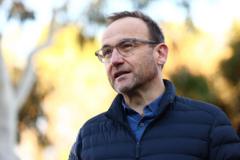José Mujica, known globally as the 'poorest president' for his humble living while in office, passed away at 89. The former guerrilla, who drove significant social reforms in Uruguay from 2010 to 2015, remains a polarizing figure with a legacy of both admiration and controversy.
Uruguay's José Mujica, the 'Poorest President,' Passes Away at 89

Uruguay's José Mujica, the 'Poorest President,' Passes Away at 89
Former Uruguayan leader José Mujica, famed for his modest lifestyle and progressive reforms, has died at the age of 89, leaving a complex legacy.
Former President José Mujica of Uruguay, known affectionately as "Pepe," has died at the age of 89. Renowned for his austere lifestyle and progressive governance, Mujica served as president from 2010 to 2015 and was often referred to as the world's "poorest president." Current President Yamandú Orsi announced his death on social media, expressing gratitude for Mujica's contributions and deep affection for the Uruguayan people.
The cause of death remains undisclosed, but Mujica had been suffering from oesophageal cancer. His legacy is marked by advocacy for social justice, including the legalization of marijuana, which positioned Uruguay as a global leader in progressive drug policy. Despite his acclaim, Mujica's tenure was not without controversy; some of his economic policies faced criticism for increasing public spending and failing to adequately address declining educational standards.
Born in Montevideo, Mujica's path to presidency began through a tumultuous history as a member of the leftist urban guerrilla group, Tupamaros National Liberation Movement (MLN-T). Actively engaging in guerrilla activities during the 1960s, Mujica was captured multiple times during this period, suffering imprisonment under harsh conditions until Uruguay returned to democracy in 1985 after years of military rule.
After his release, Mujica returned to politics, eventually joining the left-wing coalition Frente Amplio. His election as president marked a transformative period for the left in Latin America, coinciding with leaders like Brazil’s Luiz Inácio Lula da Silva and Venezuela's Hugo Chávez. Mujica's economic policies facilitated steady growth and reduced poverty during his term, though critics pointed to rising fiscal deficits.
True to his persona of humility, Mujica opted to live in his modest home rather than the presidential mansion, frequently using his beloved 1987 Volkswagen Beetle. He often spoke against consumerism, famously stating, "Poor are those who want more," emphasizing his belief in a simpler life. After stepping down, Mujica remained a respected figure in Uruguay, inspiring many with his philosophies on life and governance.
Mujica's political legacy is underscored by his significant domestic approval ratings, and while he was never implicated in corruption, criticisms about the educational system persisted throughout his administration. Following his retirement in 2020, he remained engaged in political discourse until his battle with cancer.
Even as his health deteriorated, Mujica remained contemplative about death, reflecting in interviews about its inevitability. His legacy as a unique and influential leader who challenged political norms resonates deeply in Uruguay and beyond, leaving behind a complicated but impactful narrative on leadership and democracy.






















